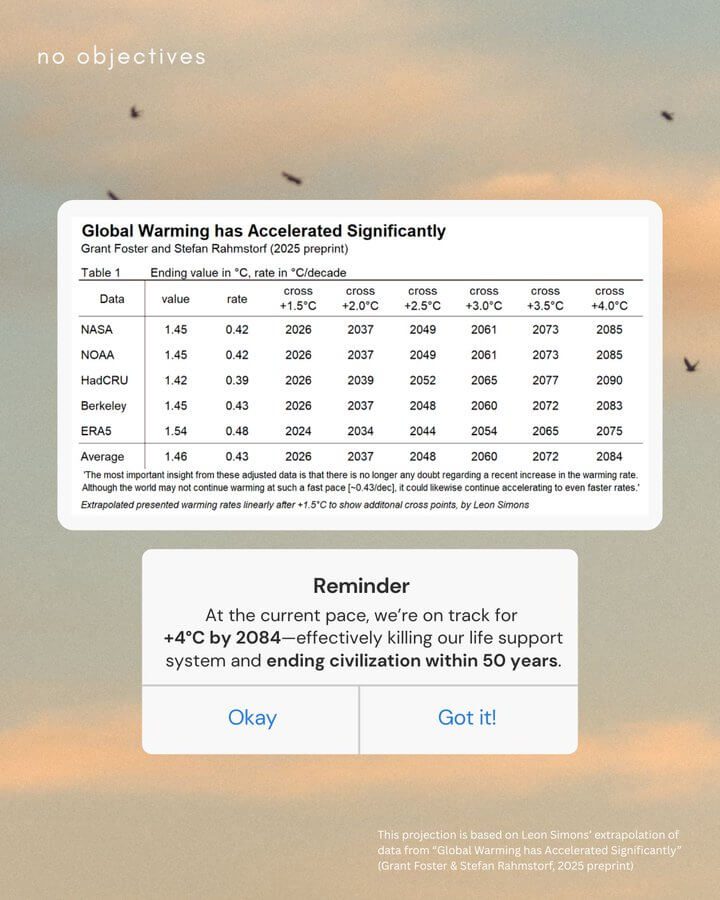It’s such a sh*t show out there, it’s hard to keep our head straights, right? Every day we hear shocking stories from Gaza (how do you recover from that?), more death and destruction in Ukraine at the hands of Russia (peace my arse),to Trump threatening 50% tariffs on the EU which crashed markets again, and he’s probably doing it out of spite because the EU signed a minerals deal with Greenland. Who knows with Trump.
A Ugandan activist was brutally raped and tortured in neighbouring Tanzania at the direction of the government, the international student fiasco at Harvard continues (causing a lot of angst around the world and in the US), and more fun in the White House with Trump showing false information to justify the “white genocide” in South Africa. At least we know he is capable of using the word genocide!
Definitely a definite sh*t show and it’s not going to calm down anytime soon, but we must all fight to move our world in the right direction. We can not be apathetic. We can not sit back. The world is moving rapidly into very dangerous territory, so please, stand up, speak up, act!
On Climate Courage yesterday, we focused on the actions we can all take – here’s a link to the content discussed. We didn’t get all the way through, and we didn’t get to the news, so for the reads this week, I’m going to focus on the content we wanted to discuss. While all the crazy stuff keeps going on around the world – especially geopolitically – what really matters is this.
First up is this absolutely heartbreaking story coming out of Australia. Mass deaths of sea life off the coast of South Australia.
Peak Oil
Something we’ve been hearing about for decades, have we finally hit peak oil? In case you don’t understand the term: “Peak oil” doesn’t mean we are running out of oil. It means that we have hit a maximum level of oil production, and after that point, production begins to decline.
It further explains: The concept was popularized in the 1950s by geophysicist Shell M. King Hubbert, who predicted that U.S. oil production would peak around 1970. That prediction was initially correct, but it didn’t account for the eventual surge in unconventional oil-especially from shale-which temporarily reversed that decline decades later.
It’s an important issue to understand, because the fossil fuel industry underpins our global economy – The Return of Peak Oil | OilPrice.com.
A new economic order is required
One way or another, we will have to build a new global economy, one that operates at natures’ pace (as Dr David Ko and Richard Busellato always say) and there will be a lot of conversations about what that looks like. In that regard, I found this interesting – Trump’s tariffs are failing, but the old model won’t save us either | Business and Economy | Al Jazeera. On future shows, David and Richard are going to talk about the real issues we are facing in the global economy and what we need to do about it.
The poles
There is a lot of information coming out on both poles, and while there’s political shenanigans happening (this is a great read: Tensions rise as China, Russia, US and Europe scramble for Arctic), there’s much more important news afoot.
For example, Sea level rise will cause ‘catastrophic inland migration’, scientists warn | Climate crisis | The Guardian.
One of the challenges in this reporting is how quickly the earth will warm. In this article, it suggests: The average global temperature rise hit 1.5C for the first time in 2024. But the international target is measured as the average over 20 years, so is not considered to have been broken yet.
Leon Simons, a climate scientist I follow on Twitter, shared this data this week. So anytime you’re reading projections towards 2100, remember this and the fact everything is happening faster than the climate scientist predicted. The use of the word unprecedented has become unprecedented for a reason.

More reading
- Earth’s major climate goal is too warm for the polar ice sheets, study says
- Ice melt opens up enormous cracks in Greenland’s ice sheet » Yale Climate Connections
- Even NASA didn’t see it coming: a sudden ocean shift could change everything – Futura-Sciences
- The decline of key Atlantic currents is underway, and it’s been flooding parts of the US for 20 years | Live Science
- Antarctica’s ice loss doubles since 2020, what this means for coastal cities
- A crucial system of ocean currents is slowing. It’s already supercharging sea level rise in the US. | CNN
Fire
Another harrowing read: the destruction of the world’s forests reached the highest level ever recorded in 2024, driven by a surge in fires caused by global heating – Fires drove record loss of world’s forests last year, ‘frightening’ data shows | Deforestation | The Guardian.
We have lost an area the size of Italy to agriculture, fires, logging and mining, and worse, in the tropics (where I am), which has the most biodiverse and carbon-dense forests on the planet, fire has also become the most significant reason for forest loss, since global records began.
A quote from the report – of the 20 countries with the largest areas of pristine forest, 17 are now losing trees at a faster rate than when the 2021 Glasgow deal was signed.
Has a feedback loop been triggered? What are we going to do about it?
Flooding events
As an Australian, it’s been heartbreaking watching the latest floods in Australia, with five now confirmed dead from this one-in-500-year event.
There have also been floods in Argentina, which will have food security implications around the world:
- Argentina’s farmers describe ‘sea of water’ after downpour hits harvest | Reuters
- Severe floods hit Argentina farm region, thousands evacuate | Reuters
And in India, Bengaluru: Parts of India’s ‘Silicon Valley’ flooded after heavy rains.
There are, of course, more.
Extreme heat events
I feel for the poorest in the world, experiencing extreme heat earlier than normal, which means it will go on for longer. For those who don’t die, the longer-term implications of organ damage (like kidneys) will be an on-going issue. You can’t escape heat like this – ‘The fans just circulate hot air’: how indoor heat is making life unbearable in India’s sweltering cities | Global development | The Guardian.
- Majority of Indian districts face high heatwave risk, study shows – CNA
- Record May heat scorches north, central China
- bne IntelliNews – Middle East braces for intense heatwave, with temperatures set to surpass 50°C
Heat isn’t just on land, as we are seeing around the UK and Ireland –‘Unprecedented’ marine heatwave hits waters around Devon, Cornwall and Ireland | Marine life | The Guardian.
Spare a thought for the farmers and people in Syria
Sargassum bloom
We took our boys to this part of Florida when there was a Sargassum bloom before the pandemic and we got out after one night. It was painfully irritating to your eyes, throat and skin – 31 million tons of supercharged seaweed is creeping toward beaches in Florida and around the Caribbean | CNN.
The cause? Rising ocean temperatures are supercharging the seaweed and this year’s bloom is 40 percent bigger than the previous record from June 2022. However, it’s also happening because of excess of nitrogen in the water, and while some of this can be natural, agricultural fertilizers are a BIG part of this.
Tornados in the US, nearly 50 dead
There might be newer data, but the tornados in the US have packed a deadly punch, and the people impacted have been left to face it, without federal government support.
This story is astonishing! Kentucky Tornado Tears Love Apart: US Couple Loses Arms While Hugging Each Other During Deadly Storm
Planetary Nationalism – an important piece
And finally, The New Planetary Nationalism – NOEMA, which I’ve tried to discuss on the previous two shows, but it’s a massive topic and we just don’t have time to do it justice.
PLEASE read this article and understand this issue. It is not the direction we want to go in, and those pushing for this are not factoring us into their plans. We would be stupid to ignore this.
Here’s some paragraphs to give you a sense of it
The expansion of nationalism to planet-scale phenomena is not limited to the militarization of outer space, nor solely an American action. It belongs to a growing global trend we identify as “planetary nationalism.”
This trend includes far-right parties in Europe yoking concerns about humanity’s impact on Earth’s environmental systems to ideas of “green nationalism”; Russian government officials forecasting that more of the country will become arable and habitable in a warmer world; the drive to develop AI because it could become a form of distributed planetary intelligence aligned to any value system; and explicit appeals to planetary concepts by nationalists like Steve Bannon, who has voiced an attraction to the idea of the “noosphere,” or the planetary sphere of entwined human and technological activity.
The consequences of this trend are potentially seismic: Recognizing that we are all mutually and inextricably embedded in Earth’s systems does not inevitably create a cosmopolitan politics oriented toward the well-being of humankind as a whole. It is becoming clear that the political resonance of planetary mindsets is fraught and variable, often manifesting in domestic politics and international relations as forms of exclusionary techno-nationalism in tension with the realities of shared human embeddedness in natural systems at the planetary scale.
Yet if planetary politics now appears to be splintering, with planetary nationalism existing alongside or even in opposition to cosmopolitanism, what about the prospects of planetary governance? If planetary themes are spreading politically, why haven’t we seen a corresponding development of viable planetary institutions oriented toward planetary challenges, from human impact on the Earth system to the rise of AI’s potential expressions of intelligence?
Planetary nationalist politics and planetary technoscience escalate in tandem, boosting each other while planetary governance lags behind. This combination increases the likelihood of driving the entire human community headlong into a more fractured political environment at a time of overlapping planetary crises that include but go well beyond climate change.
It is possible that these planetary nationalist scenarios, where nations compete with one another for various forms of climate-induced hegemony, might yet give rise to something that approximates a distributed form of planetary action (if not governance institutions). Each nation pursuing its interests in isolation could collectively result in something at least akin to planetary politics (or Gaiapolitik), even if these developments are not motivated by a quest for a unified planetary front. As Nathan Gardels, this magazine’s editor-in-chief, has suggested: “Though each [nation] may be going it alone, all are going in the same direction.” This is not ideal, but it’s better than nothing.
And yet, some nations may see the planetary challenge of a rapidly changing climate not as a shared future to be averted but as a strategic opportunity.
Such entanglements between ambitious, influential tech figures and planetary nationalist politicians — a union of profit, power and technoscientific acceleration and experimentation — leave little opportunity for the parallel development of planetary governance.
This would mean gathering the political will to cocreate planetary governance structures that are commensurate with our planetary impacts and politics, and cocreate them in time to avoid catastrophe. We should continue to remind ourselves that this task extends beyond climate and the Earth system. It includes all other planetary questions that humans now confront, from AI in its potential planetary intelligence to pandemics. We must now engage all of these at the same time.
Some extra reading
- Amazing journalism – Ice roads are a lifeline for First Nations. As Canada warms, they’re disappearing. | Grist
- Ugh – The birds on Lord Howe Island are now so full of plastic, they crunch – ABC News
- Good – Spain blocks more than 65,000 Airbnb holiday rental listings – CNA
- We can’t keep growing the way we are growing – Carbon emissions from tourism are rising disproportionately fast
- Ugh – This land is their land: Trump is selling out the US’s beloved wilderness | Public lands | The Guardian
- Of course they do – Revealed: European ‘green’ investments hold billions in fossil fuel majors | Green economy | The Guardian
- Only going to get worse – ‘Where conflict, poverty and climate collide’: Number of internally displaced people tops 80 million | Euronews
- I’ll finish with this crazy story – Man wakes up to find a giant cargo ship in his yard
Favorite memes, cartoons, Tweets, etc…
Touché

Fair

So many clowns!

I haven’t seen any media coverage on this – if this is true, why?

My content and my pals
We covered lots of ways we can all contribute to shrinking our energy and material consumption by 70% on Climate Courage this week. Start with one action and build from there. It’s time for us to stop feeling powerless in this fight.
Dig into the news
Plenty more to read, listen to or watch, so do click through to the reads at the image below, and a reminder, this platform has articles going back weeks, so have a scan and read/watch/listen to whatever jumps out at you.

Let me know what caught your attention? Or share with me what has your attention now? There’s a lot going on, which means none of us can cover everything. Besides, it’s always great to get feedback so I know I’m delivering something of value.
Cheers
Andrea
All my contact information is here.
If you want to support my work, please share my work, subscribe to my social channels, or at least buy me a coffee here.

Uncommon Courage: an invitation
Uncommon Courage is an invitation to be your courageous best self every day. It’s also an antidote to the overwhelm, fear, and rage rolling around the world. But it’s more than a book; it’s an invitation to join an inclusive community that wants to better understand humanities challenges – both global and personal – in order to take courageous action and create a better world for everyone.
You can buy it on Amazon, Apple Books, Barnes & Noble, Book Depository, Booktopia, Smashwords, Kobo, Gardners, Odilo, Indie Bound, BookShop by BookTrib and Scribd.
Better yet, order it from your local bookstore, so you can #SupportLocal.
You can read the reviews, including a new five-star review on Book Commentary, another five-star review on ReaderViews, a review on BookTrib, and three more on Booklife, another on Book Commentary and Blue Ink Reviews. I’m also collating reviews on my Website too. Have a look and grateful to everyone who has written or recorded one.
Come and join the conversation in my Facebook Group One Billion People with Uncommon Courage.
Listen in to the Uncommon Courage, the podcast on Apple, Spotify and everywhere podcasts are published.
The Know Show
Check out The Know Show. It’s a fortnightly wrap up of the news, with a special guest every week.
Climate Courage
A fortnightly conversation on issues that matter to you and I, focusing on the actions we can all take.
18 Steps to an All-Star LinkedIn Profile
Listed by Book Authority in the 100 Best LinkedIn Books of All Time and 22 Best New LinkedIn eBooks To Read In 2021 and 2022 categories. Grab it today if you want to take your professional presence to the next level! When it comes to LinkedIn, it really is time to ask — can you really afford not to have this book in the hands of every employee?
Are you a Social CEO? The Social CEO: How Social Media Can Make You A Stronger Leader.
Want to claim your stage? Unleash Your Voice – Powerful Public Speaking for Every Woman
Feedback
Have I done a great job for you? Can you write a reference on my LinkedIn profile or on my Google Business page? If not for me, why not write one for someone else who inspires you or has helped you? Join the #GivingEconomy.

